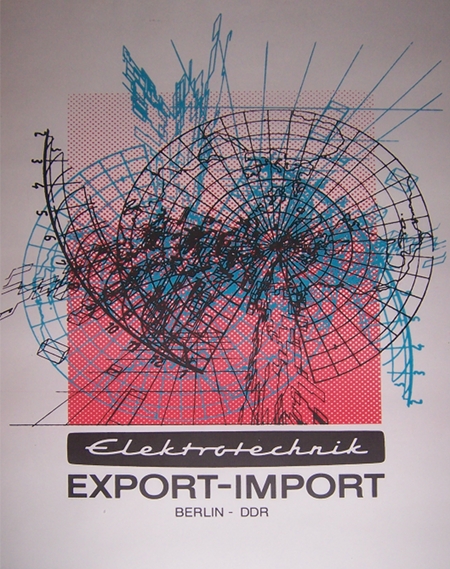about that wall through the streets of Berlin

(old GDR advertisement of the electrical engineering industry)
There was a longer discussion on that randform post about oppression in the GDR. Within the discussion a randform reader called Ditta found my opinion that “part of all that huge mess of a wall through the streets of Berlin was plain economic warfare” absurd. This is still my opinion: there were surely people running away from East Germany for pure political reasons, but I dare say that a not to small part left for economical reasons. Moreover this reasoning doesnt justify the wall, I think it is clear that the wall was an inhuman mistake. The discussion just sheds a different light on the involved motivations.
I currently have not the time to discuss this in detail and since this is a different thread I hereby link to the comment which led to Ditta’s reaction and ask people who wish to discuss this issue to leave their comments here at this thread.
Blogwise – I am currently preparing a blog entry, which takes more time than I would have suspected…in particular I am not on vacation.
January 26th, 2017 at 2:51 pm
Wikipedia says that the east german communists called the wall “Anti-Fascist Protective Wall” but the reference link is broken. Is this true? I mean who would believe this?
January 27th, 2017 at 12:19 pm
Yes it is true, that is I heard this in person out of the mouth of east german officials, sometimes I think I also heard the term “antiimperialistic Schutzwall”. The term “Anti-Fascist Protective Wall” was apparently coined by Horst Sindermann.
In a documentation from Dirk Schindelbeck at the Bundeszentrale für politische Bildung it is written:
translation without guarantee:
It should be remarked at this point that Sindermann was persecuted by the Nazi’s and imprisoned in concentration camps. Moreover it is true that GDR officials were pointing out that a lot of Nazis were still in ranks within Westgermany, especially in the juridicial circles. However there were still also Nazi’s in ranks in Eastgermany. In how far the eastgerman government was more successful in eliminating Nazi’s is still debated.
But back to the wall and what I said above about the economic problems. I find this is quite clearly documented in an article by Alexandra Luther/Karl Obermanns at the German Broadcasting Archive:
I translate this another time.
January 27th, 2017 at 1:03 pm
In reference to the comment abpve I would like to point out that today is Holocaust Remembrance Day commemorating the Holocaust.
The german parlament held a special memorial hour dedicated to the Nazi
Euthanasia victims, i.e. victims of Aktion T4. (see also randform post: Lobetal -in food chains)